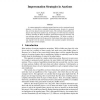Free Online Productivity Tools
i2Speak
i2Symbol
i2OCR
iTex2Img
iWeb2Print
iWeb2Shot
i2Type
iPdf2Split
iPdf2Merge
i2Bopomofo
i2Arabic
i2Style
i2Image
i2PDF
iLatex2Rtf
Sci2ools
WINE
2010
Springer
2010
Springer
Impersonation Strategies in Auctions
A common approach to analyzing repeated auctions, such as sponsored search auctions, is to treat them as complete information games, because it is assumed that, over time, players learn each other's types. This overlooks the possibility that players may impersonate another type. In this paper, we show that many standard auctions, including the Kelly mechanism, generalized second price auctions, and core-selecting auctions, have profitable impersonations. We define a notion of impersonation-proofness for the process by which players learn about each other's type together with the auction mechanism and associated complete information game and give several examples.
Auction | Economy | Information Game | Search Auctions | WINE 2010 |
| Added | 15 Feb 2011 |
| Updated | 15 Feb 2011 |
| Type | Journal |
| Year | 2010 |
| Where | WINE |
| Authors | Ian A. Kash, David C. Parkes |
Comments (0)

